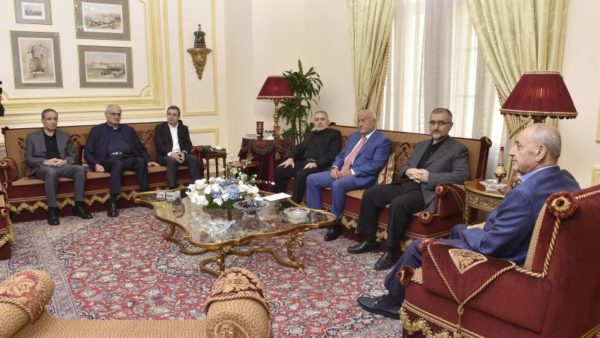 Hezbollah and the Progressive Socialist Party on Saturday sealed their political reconciliation in Ain el-Tine, home of Speaker Nabih Berry after months of tensions between the two groups amidst differences over local and regional political issues.
"We can talk today about a frank meeting and a reconciliation, and this meeting is in the interest of the country," confirmed Hussein Khalil, Hezbollah Secretary General Hassan Nasrallah's political assistant in a joint briefing with Ghazi Aridi, former minister and adviser to
PSP leader Walid Jumblatt. "We have agreed to manage our differences, which will benefit the stability of the country." Speaker Berry decided to take charge of closing the ranks between Hezbollah and the PSP in order to deal with Important issues awaiting the country, and we have charged him to put in place the bases of the solutions to all the problems "between the two parties , explained the Hezbollah official. "The basics of solutions to all questions have been defined, including political issues," said Hussein Khalil.
For his part, Ghazi Aridi asserted that the meeting was "positive, productive, frank and friendly so that things could get back to normal and we have agreed to settle the contentious issues through dialogue". "We have a long history of working together with Hezbollah, and we thank Speaker Berry for his outstanding efforts, which have made progress in the past during difficult periods as well as today, "added the former minister.
Hezbollah and the Progressive Socialist Party on Saturday sealed their political reconciliation in Ain el-Tine, home of Speaker Nabih Berry after months of tensions between the two groups amidst differences over local and regional political issues.
"We can talk today about a frank meeting and a reconciliation, and this meeting is in the interest of the country," confirmed Hussein Khalil, Hezbollah Secretary General Hassan Nasrallah's political assistant in a joint briefing with Ghazi Aridi, former minister and adviser to
PSP leader Walid Jumblatt. "We have agreed to manage our differences, which will benefit the stability of the country." Speaker Berry decided to take charge of closing the ranks between Hezbollah and the PSP in order to deal with Important issues awaiting the country, and we have charged him to put in place the bases of the solutions to all the problems "between the two parties , explained the Hezbollah official. "The basics of solutions to all questions have been defined, including political issues," said Hussein Khalil.
For his part, Ghazi Aridi asserted that the meeting was "positive, productive, frank and friendly so that things could get back to normal and we have agreed to settle the contentious issues through dialogue". "We have a long history of working together with Hezbollah, and we thank Speaker Berry for his outstanding efforts, which have made progress in the past during difficult periods as well as today, "added the former minister.Hezbollah's Liaison and Coordination Unit Chief, Wafic Safa, and Minister of Industry and PSPMP Waël Abou Faour also attended the meeting.
Nabih Berry, who heads the Shiite Amal Movement, is a close ally of Hezbollah, but also has close ties to Jumblatt. This meeting that sealed the reconciliation was preceded by another,on August 22 according to Aridi.
PSP and Hezbollah diverge on many strategic issues, but it is Jumblatt's stance on the Israeli-held Shebaa farms, claiming that they were not Lebanese, that provoked the ire of Hezbollah leader Hassan Nasrallah, pushing for break-up of contacts between the two parties.
At the time, the Shiite party sources quoted by the al-Markaziya agency had stated that Walid Jumblatt had "crossed the red lines" by making this statement. These tensions had coincided with the decision of Abou Faour to cancel the construction of a cement plant due pressure from residents - of a Ain Dara, in Mount Lebanon which is , owned by Pierre Fattouche and relatives and allies of Syrian dictator Bashar al Assad
A few weeks later, the inter-clashes of Qabr Shmoun provoked an institutional crisis paralyzing the Government of PM Saad Hariri to the point of reviving the old cleavages between March 8 (Iran-Syria camp) and March 14 (sovereignist camp). The crisis finally ended in favor of Jumblatt, after an official US intervention and another behind the scene Russian intervention. The epilogue took place during a reconciliation meeting in Baabda
L'Orient-Le Jour
 Learn to pronounce
Learn to pronounceWeb results
Google Store
Google App Engine
Translation
Google Translate
Google Play
G Suite
Google Japanese Input
 Learn to pronounce
Learn to pronounceWeb results
Google Store
Google App Engine
Translation
Google Translate
Google Play
G Suite
Google Japanese Input

Leave a Reply
You must be logged in to post a comment.